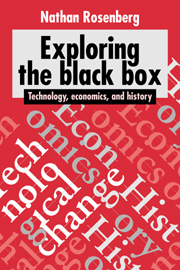Book contents
- Frontmatter
- Contents
- List of figures
- Preface
- Introduction
- Part I Dealing with an uncertain future
- Part II Technology in context
- 5 Economic experiments
- 6 Why in America?
- 7 Can Americans learn to become better imitators?
- 8 Critical issues in science policy research
- Part III Sectoral studies in technological change
- Index
5 - Economic experiments
Published online by Cambridge University Press: 12 November 2009
- Frontmatter
- Contents
- List of figures
- Preface
- Introduction
- Part I Dealing with an uncertain future
- Part II Technology in context
- 5 Economic experiments
- 6 Why in America?
- 7 Can Americans learn to become better imitators?
- 8 Critical issues in science policy research
- Part III Sectoral studies in technological change
- Index
Summary
This chapter will offer an historical examination of a certain kind of freedom and the economic consequences that have flowed from it. It will focus upon the freedom to perform economic experiments, understanding the expression in the broadest sense to include experimentation with new forms of economic organization as well as the better-known historical experiments that have been responsible for new products and new manufacturing technologies. It will be argued that the freedom to undertake such experiments has been the essential element accounting for the fact that industrialization has been, uniquely, an historical product of capitalist societies.
The perspective suggested here is not, of course, entirely novel. Marx understood very well that the new technology that was transforming Great Britain in the century before the publication of The Communist Manifesto was inseparably linked to capitalist institutions. Marx grasped a part of this story so firmly that his treatment must, necessarily, be the starting point for this chapter, but, as we will see, Marx missed some fundamental parts of the story. Moreover, we now have the distinct advantage over Marx of more than a century of further capitalist performance and more than seventy years of history of a large socialist economy that adopted a distinctly different posture toward the freedom to conduct organizational experiments. Thus, we start with Marx and the big issues connected with the economic growth experience of the west.
The argument will be advanced through a consideration of some of the salient features of western institutional history and more recent developments in the eastern European socialist world.
- Type
- Chapter
- Information
- Exploring the Black BoxTechnology, Economics, and History, pp. 87 - 108Publisher: Cambridge University PressPrint publication year: 1994
- 4
- Cited by



